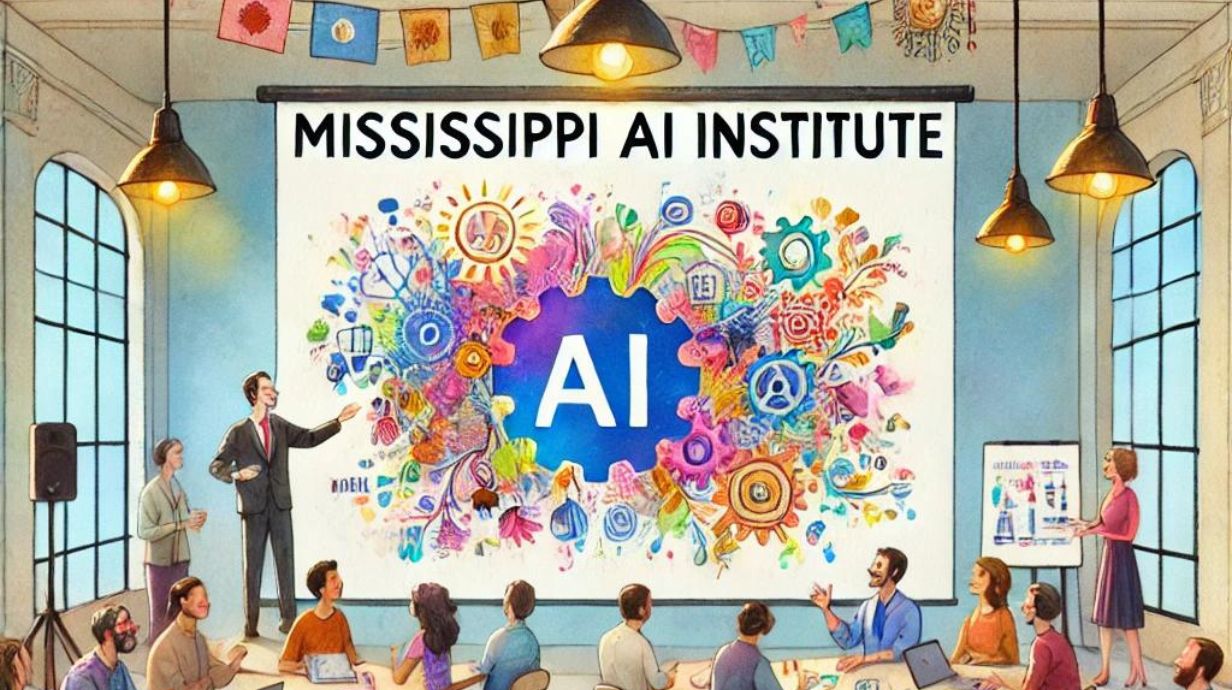AI for Teachers
AIG has partnered with a number of campus units to offer training in applied AI and resources for AI literacy.

AI Training & Resources
Find all of our AI training and resources below.
The Mississippi AI Institute for Teachers was created by the Department of Writing and Rhetoric, with seed funding from the Institute of Data Science. It has since partnered with the Center for Excellence in Teaching and Learning and the Academic Innovations Group to offer training for faculty in applied AI.
- Training sessions take place in a variety of formats and modalities. You can read more about our January 2024 AI Winter Institute for Teachers and explore the open-access curriculum.
- To learn more about the history of the program and its impact, you can read AI is forcing teachers to confront an existential question from the Washington Post.
AI literacy is a segment of existing media literacy. In the field of applied AI, AI literacy refers to using generative tools, like ChatGPT, and understanding their affordances and limitations. Critical AI literacy explores areas related to the social, economic, environmental, and ethical challenges posed by this emerging technology.
Helpful Resources:
- The UM Library's Artificial Intelligence Committee has developed helpful guides about AI literacy
- AI Literacy: A Framework to Understand, Evaluate, and Use Emerging Technology from Digital Promise
- What I Mean When I Say Critical AI Literacy by Maha Bali
Microsoft Copilot
All UM faculty, staff, and students have access to the enterprise versions of Microsoft Copilot. Copilot is Microsoft’s AI-powered chat interface. It uses a version of OpenAI’s GPT-4. All chats are protected under Microsoft’s data protection agreement. Even so, we do not advise uploading sensitive data, or any data that contains FERPA or HIPPA-related material.
- To access Copilot, Simply go to Microsoft Copilot on any web browser and enter your UM credentials. You should be logged into UM’s enterprise version and see a checkmark in the upper right-hand corner that indicates their chat is protected.
Blackboard’s AI Design Assistant
Blackboard Ultra courses have access to the AI Design Assistant for instructional design. You can create course elements with the AI Design Assistant, including rubrics, discussion posts, assignments, and course modules, and upload your syllabus to have the AI generate materials related to your teaching. For more information about Blackboard’s AI Design Assistant, please contact FTDC.
The UM library developed an excellent series of AI resources for faculty to use.
A Framework for AI in Education
Find our resources for navigating AI in education below.
Normalize openly labeling AI-generated content, for educators, students, and administrators. Open disclosure builds mutual trust and models ethical behavior.
Resources:
- Why We Should Normalize Open Disclosure of AI Use from the Chronicle of Higher Education
- A template: “AI Usage Disclosure: This document was created with assistance from AI tools. The content has been reviewed and edited by a human. For more information on the extent and nature of AI usage, please contact the author.”
- Or with more specifics: “AI Usage Disclosure: This document [include title] was created with assistance from [specify the AI tool]. The content can be viewed here [add link] and has been reviewed and edited by [author’s full name]. For m
Give students mechanisms to make their learning transparent if AI is used. Students can evaluate how AI contributed to or hindered their learning using reflection and other questions designed for critical thinking. Doing so helps us understand if they're actually learning while using AI or just using it as a time-saving shortcut.
Resources:
Be prepared for students who challenge ethical frameworks and explore restorative practices for academic misconduct cases involving AI, focusing on repairing trust rather than just punishment. Resources:
- Restorative Practices for Disciplinary Cases from the University of Pennsylvania
- Restorative Practices as an Outcome of the Conduct Process from UT Austin
